- Home
- Chuck Palahniuk
Tell-All
Tell-All Read online
Also by Chuck Palahniuk
Fight Club
Survivor
Invisible Monsters
Choke
Lullaby
Fugitives and Refugees
Diary
Stranger Than Fiction
Haunted
Rant
Snuff
Pygmy
To E.A.H.
Boy meets girl.
Boy gets girl.
Boy kills girl?
ACT I, SCENE ONE
Act one, scene one opens with Lillian Hellman clawing her way, stumbling and scrambling, through the thorny nighttime underbrush of some German schwarzwald, a Jewish baby clamped to each of her tits, another brood of infants clinging to her back. Lilly clambers her way, struggling against the brambles that snag the gold embroidery of her Balenciaga lounging pajamas, the black velvet clutched by hordes of doomed cherubs she’s racing to deliver from the ovens of some Nazi death camp. More innocent toddlers, lashed to each of Lillian’s muscular thighs. Helpless Jewish, Gypsy and homosexual babies. Nazi gestapo bullets spit past her in the darkness, shredding the forest foliage, the smell of gunpowder and pine needles. The heady aroma of her Chanel No. 5. Bullets and hand grenades just whiz past Miss Hellman’s perfectly coiffed Hattie Carnegie chignon, so close the ammunition shatters her Cartier chandelier earrings into rainbow explosions of priceless diamonds. Ruby and emerald shrapnel blasts into the flawless skin of her perfect, pale cheeks.… From this action sequence, we dissolve to:
Reveal: the interior of a stately Sutton Place mansion. It’s some Billie Burke place decorated by Billy Haines, where formally dressed guests line a long table within a candlelit, wood-paneled dining room. Liveried footmen stand along the walls. Miss Hellman is seated near the head of this very large dinner party, actually describing the frantic escape scene we’ve just witnessed. In a slow panning shot, the engraved place cards denoting each guest read like a veritable Who’s Who. Easily half of twentieth-century history sits at this table: Prince Nicholas of Romania, Pablo Picasso, Cordell Hull and Josef von Sternberg. The attendant celebrities seem to stretch from Samuel Beckett to Gene Autry to Marjorie Main to the faraway horizon.
Lillian stops speaking long enough to draw one long drag on her cigarette. Then to blow the smoke over Pola Negri and Adolph Zukor before she says, “It’s at that heart-stopping moment I wished I’d just told Franklin Delano Roosevelt, ‘No, thank you.’ ” Lilly taps cigarette ash onto her bread plate, shaking her head, saying, “No secret missions for this girl.”
While the footmen pour wine and clear the sorbet dishes, Lillian’s hands swim through the air, her cigarette trailing smoke, her fingernails clawing at invisible forest vines, climbing sheer rock cliff faces, her high heels blazing a muddy trail toward freedom, her strength never yielding under the burden of those tiny Jewish and homosexual urchins.
Every eye, fixed, from the head of the table to the foot, stares at Lilly. Every hand crosses two fingers beneath the damask napkin laid in every lap, while every guest mouths a silent prayer that Miss Hellman will swallow her Chicken Prince Anatole Demidoff without chewing, then suffocate, writhing and choking on the dining room carpet.
Almost every eye. The exceptions being one pair of violet eyes … one pair of brown eyes … and of course my own weary eyes.
The possibility of dying before Lillian Hellman has become the tangible fear of this entire generation. Dying and becoming merely fodder for Lilly’s mouth. A person’s entire life and reputation reduced to some golem, a Frankenstein’s monster Miss Hellman can reanimate and manipulate to do her bidding.
Beyond her first few words, Lillian’s talk becomes one of those jungle sound tracks one hears looping in the background of every Tarzan film, just tropical birds and Johnny Weissmuller and howler monkeys repeating. Bark, bark, screech … Emerald Cunard. Bark, growl, screech … Cecil Beaton.
Lilly’s drivel possibly constitutes some bizarre form of name-dropping Tourette’s syndrome. Or perhaps the outcome of an orphaned press agent raised by wolves and taught to read aloud from Walter Winchell’s column.
Her compulsive prattle, a true pathology.
Cluck, oink, bark … Jean Negulesco.
Thus, Lilly spins the twenty-four-carat gold of people’s actual lives into her own brassy straw.
Please promise you did NOT hear this from me.
Seated within range of those flying heroic elbows, my Miss Kathie stares out from the bank of cigarette smoke. An actress of Katherine Kenton’s stature. Her violet eyes, trained throughout her adult life to never make contact with anything except the lens of a motion picture camera. To never meet the eyes of a stranger, instead to always focus on someone’s earlobe or lips. Despite such training, my Miss Kathie peers down the length of the table, her lashes fluttering. The slender fingers of one famous white hand toy with the auburn tresses of her wig. The jeweled fingers of Miss Kathie’s opposite hand touch the six strands of pearls which contain the loose folds of her sagging neck skin.
In the next instant, while the footmen pass the finger bowls, Lillian twists in her chair, shouldering an invisible sniper’s rifle and squeezing off rounds until the clip is empty. Still just dripping with Hebrew and Communist babies. Lugging her cargo of Semitic orphans. When the rifle is too searing hot to hold, Miss Hellman howls a wild war whoop and hurtles the steaming weapon at the pursuing storm troopers.
Snarl, bark, screech … Peter Lorre. Oink, bark, squeal … Averill Harriman.
It’s a fate worse than death to spend eternity in harness, serving as Lilly Hellman’s zombie, brought back to life at dinner parties. On radio talk programs. At this point, Miss Hellman is heaving yet another batch of invisible babies, rescued Gypsy babes, high, toward the chandelier, as if catapulting them over the snowcapped peak of the Matterhorn to the safety of Switzerland.
Grunt, howl, squeal … Sarah Bernhardt.
By now, Lillian Hellman wraps two fists around the invisible throat of Adolf Hitler, reenacting how she sneaked into his subterranean Berlin bunker, dressed as Leni Riefenstahl, her arms laden with black-market cartons of Lucky Strike and Parliament cigarettes, and then throttled the sleeping dictator in his bed.
Bray, bark, whinny … Basil Rathbone.
Lilly throws the terrified, make-believe Hitler into the center of tonight’s dinner table, her teeth biting, her manicured fingernails scratching at his Nazi eyes. Lillian’s fists clamped around the invisible windpipe, she begins pounding the invisible Führer’s skull against the tablecloth, making the silverware and wineglasses jump and rattle.
Screech, meow, tweet … Wallis Simpson.
Howl, bray, squeak … Diana Vreeland.
A moment before Hitler’s assassination, George Cukor looks up, his fingertips still dripping chilled water into his finger bowl, that smell of fresh-sliced lemons, and George says, “Please, Lillian.” Poor George says, “Would you please stuff it.”
Seated well below the salt, below the various professional hangers-on, the walking men, the drug dealers, the mesmerists, the exiled White Russians and poor Lorenz Hart, really at the very horizon of tonight’s dinner table, a young man looks back. Seated on the farthest frontier of placement. His eyes the bright brown of July Fourth sunlight through a tall mug of root beer. Quite the American specimen. A classic face of such symmetrical proportions, the exactly balanced type of face one dreams of looking down to find smiling and eager between one’s inner thighs.
Still, that’s the trouble with only a single glance at any star on the horizon. As Elsa Maxwell would say, “One can never tell for certain if that dazzling, shiny object is rising or setting.”
Lillian inhales the silence through her burning cigarette. Taps the gray ash onto her bread plate. In a blast of smoke, she says,
“Did you hear?” She says, “It’s a fact, but Eleanor Roosevelt chewed every hair off my bush.…”
Through all of this—the cigarette smoke and lies and the Second World War—the specimen’s bright brown eyes, they’re looking straight down the table, up the social ladder, gazing back, deep, into the famous, fluttering violet eyes of my employer.
ACT I, SCENE TWO
If you’ll permit me to break the fourth wall, my name is Hazie Coogan.
My vocation is not that of a paid companion, nor am I a professional housekeeper. It is my role as an old woman to scrub the same pots and pans I scrubbed as a young one—I’ve made my peace with that fact—and while she has never once touched them, those pots and pans have always belonged to the majestic, the glorious film actress Miss Katherine Kenton.
It is my task to soft-boil her daily egg. I wax her linoleum kitchen floor. The endless job of dusting and polishing the not insignificant number of bibelots and gold-plated gimcracks awarded to Miss Katie, that job is mine as well. But am I Miss Katherine Kenton’s maid? No more so than the butcher plays handmaiden to the tender lamb.
My purpose is to impose order on Miss Kathie’s chaos … to instill discipline in her legendary artistic caprice. I am the person Lolly Parsons once referred to as a “surrogate spine.”
While I may vacuum the carpets of Miss Kathie’s household and place the orders with the grocer, my true job title is not majordomo so much as mastermind. It might appear that Miss Kathie is my employer in the sense that she seems to provide me funds in exchange for my time and labor, and that she relaxes and blooms while I toil; but using that same logic, it could be argued that the farmer is employed by the pullet hen and the rutabaga.
The elegant Katherine Kenton is no more my master than the piano is master to Ignace Jan Paderewski … to paraphrase Joseph L. Mankiewicz, who paraphrased me, who first said and did most of the dazzling, clever things which, later, helped make others famous. In that sense you already know me. If you’ve seen Linda Darnell as a truck-stop waitress, sticking a pencil behind one ear in Fallen Angel, you’ve seen me. Darnell stole that bit from me. As does Barbara Lawrence when she brays her donkey laugh in Oklahoma. So many great actresses have filched my most effective mannerisms, and my spot-on delivery, that you’ve seen bits of me in performances by Alice Faye and Margaret Dumont and Rise Stevens. You’d recognize fragments of me—a raised eyebrow, a nervous hand twirling the cord of a telephone receiver—from countless old pictures.
The irony does not escape me that while Eleanor Powell lays claim to my fashion signature of wearing numerous small bows, I now boast the red knees of a charwoman and the swollen hands of a scullery maid. No less of an illustrious wag than Darryl Zanuck once dismissed me as looking like Clifton Webb in a glen plaid skirt. Mervyn LeRoy spread the rumor that I am the secret love child of Wally Beery and his frequent costar Marie Dressler.
Currently, the regular duties of my position include defrosting Miss Kathie’s electric icebox and ironing her bed linens, yet my position is not that of a laundress. My career is not as a cook. Nor is domestic servant my vocation. My life is far less steered by Katherine Kenton than her life is by me. Miss Kathie’s daily demands and needs may determine my actions but only so much as the limits of a racing automobile will dictate those of the driver.
I am not merely a woman who works in a factory producing the ever-ravishing Katherine Kenton. I am the factory itself. With the words I write here I am not simply a camera operator or cinematographer; I am the lens itself—flattering, accentuating, distorting—recording how the world will recall my coquettish Miss Kathie.
Yet I am not just a sorceress. I am the source.
Miss Kathie exerts only a very small effort to be herself. The bulk of that manual labor is supplied by me in tandem with a phalanx of wig makers, plastic surgeons and dietitians. Since her earliest days under a studio contract it has been my livelihood to comb and dress her often blond, sometimes brunette, occasionally red hair. I coach the dulcet tones of her voice so as to make every utterance suggest a line of dialogue scripted for her by Thornton Wilder. Nothing of Miss Kathie is innate except for the almost supernatural violet coloring of her eyes. Hers is the throne, seated in the same icy pantheon as Greta Garbo and Grace Kelly and Lana Turner, but mine is the heavy lifting which keeps her on high.
And while the goal of every well-trained household servant is to seem invisible, that is also the goal of any accomplished puppeteer. Under my control, Miss Kathie’s household seems to smoothly run itself, and she appears to run her own life.
My position is not that of a nurse, or a maid, or a secretary. Nor do I serve as a professional therapist or a chauffeur or bodyguard. While my job title is none of the preceding, I do perform all of those functions. Every evening, I pull the drapes. Walk the dog. Lock the doors. I disconnect the telephone, to keep the outside world in its correct place. However, more and more my job is to protect Miss Kathie from herself.
Cut direct to an interior, nighttime. We see the lavish boudoir belonging to Katherine Kenton, immediately following tonight’s dinner party, with my Miss Kathie locked behind her en suite bathroom door. From offscreen, we hear the hiss and splash of a shower bath at full blast.
Despite popular speculation, Miss Katherine Kenton and I do not enjoy what Walter Winchell would call a “fingers-deep friendship.” Nor do we indulge in behavior Confidential would cite to brand us as “baritone babes,” or Hedda Hopper describes as “pink pucker sucking.” The duties of my position include placing one Nembutal and one Luminal in the cloisonné saucer atop Miss Kathie’s bedside table. In addition, filling an old-fashioned glass to overflowing with ice cubes and drop-by-drop pouring one shot of whiskey over the ice. Repeat with a second shot. Then fill the remainder of the glass with soda water.
The bedside table consists of nothing more than a stack of screenplays. A teetering pile sent by Ruth Gordon and Garson Kanin, asking my Miss Kathie to make a comeback. Begging, in fact. Here were speculative Broadway musicals based on actors dressed as dinosaurs or Emma Goldman. Feature-length animated versions of Macbeth by William Shakespeare depicted with baby animals. Voice-over work. The pitch: Bertolt Brecht meets Lerner and Loewe crossed with Eugene O’Neill. The pages turn yellow and curl, stained with Scotch whiskey and cigarette smoke. The paper branded with the brown rings left by every cup of Miss Kathie’s black coffee.
We repeat this ritual every evening, following whatever dinner party or opening my Miss Kathie has attended. On returning to her town house, I unfasten the eye hook at the top of her gown and release the zipper. Turn on the television. Change the channel. Change the television channel once more. Dump the contents of her evening bag onto the satin coverlet of her bed, Miss Kathie’s Helena Rubinstein lipstick, keys, charge cards, replacing each item into her daytime bag. I place the shoe trees within her shoes. Pin her auburn wig to its Styrofoam head. Next, I light the vanilla-scented candles lined up along the mantel of her bedroom fireplace.
As my Miss Kathie conducts herself behind the en suite bathroom door, amid the rush and steam of her shower bath, her voice through the door drones: bark, moo, meow … William Randolph Hearst. Snarl, squeal, tweet … Anita Loos.
In the center of the satin bed sprawls her Pekingese, Loverboy, amid a field of wrinkled paper wrappers, the two cardboard halves of a heart-shaped candy box, the pleated pink brocade-and-silk roses stapled to the box cover, the ruched folds of lace frilling the box edges. The bed’s billowing red satin coverlet, spread with this mess, the cupped candy papers, the sprawling Pekingese dog.
From out of Miss Kathie’s evening bag spills her cigarette lighter, a pack of Pall Mall cigarettes, her tiny pill box paved with rubies and tourmalines and rattling with Tuinal and Dexamyl. Bark, cluck, squeak … Nembutal.
Roar, whinny, oink … Seconal.
Meow, tweet, moo … Demerol.
Then, fluttering down, falls a white card. Settling on the bed, an engraved place card from this evening’
s dinner. Against the white card stock, in bold, black letters, the name Webster Carlton Westward III.
What Hedda Hopper would call this moment—a “Hollywood lifetime”—expires.
A freeze-frame. An insert-shot of the small, white card lying on the satin bed beside the inert dog.
On television, my Miss Kathie acts the part of Spain’s Queen Isabella I, escaped from her royal duties in the Alhambra for a quickie vacation in Miami Beach, pretending to be a simple circus dancer in order to win the heart of Christopher Columbus, played by Ramon Novarro. The picture cuts to a cameo by Lucille Ball, on loan out from Warner Bros. and cast as Miss Kathie’s rival, Queen Elizabeth I.
Here is all of Western history, rendered the bitch of William Wyler.
Behind the bathroom door, in the gush of hot water, my Miss Kathie says: bark, bray, oink … J. Edgar Hoover. My ears straining to hear her prattle.
Fringe dangles off the edge of the red satin coverlet, the bed canopy, the window valance. Everything upholstered in red velvet, cut velvet. Flocked wallpaper. The scarlet walls, padded and button tufted, crowded with Louis XIV mirrors. The lamps, dripping with faceted crystals, busy with sparkling thingamabobs. The fireplace, carved from pink onyx and rose quartz. The entire effect, insular and silent as sleeping tucked deep inside Mae West’s vagina.
The four-poster bed, its trim and moldings lacquered red, polished until the wood looks wet. Lying there, the candy wrappers, the dog, the place card.
Webster Carlton Westward III, the American specimen with bright brown eyes. Root-beer eyes. The young man seated so far down the table at tonight’s dinner. A telephone number, handwritten, a prefix in Murray Hill.
On the television, Joan Crawford enters the gates of Madrid, wearing some gauzy harem getup, both her hands carrying a wicker basket in front of her, the basket spilling over with potatoes and Cuban cigars, her bare limbs and face painted black to suggest she’s a captured Mayan slave. The subtext being either Crawford’s carrying syphilis or she’s supposed to be a secret cannibal. Tainted spoils of the New World. A concubine. Perhaps she’s an Aztec.

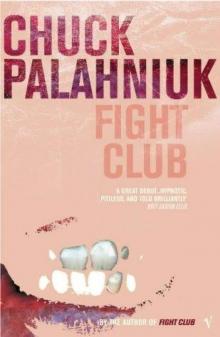 Fight Club
Fight Club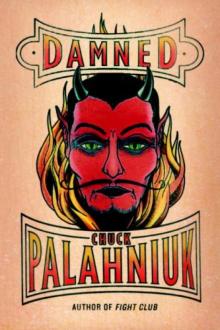 Damned
Damned Tell-All
Tell-All Choke
Choke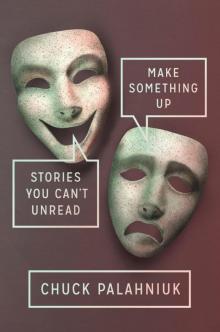 Make Something Up: Stories You Can't Unread
Make Something Up: Stories You Can't Unread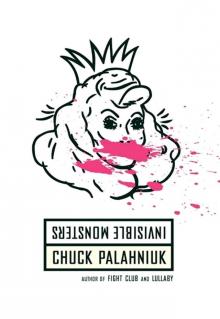 Invisible Monsters
Invisible Monsters Phoenix
Phoenix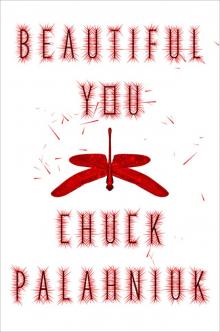 Beautiful You: A Novel
Beautiful You: A Novel Haunted
Haunted Survivor
Survivor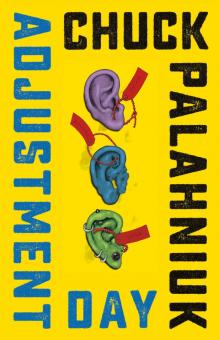 Adjustment Day
Adjustment Day Pygmy
Pygmy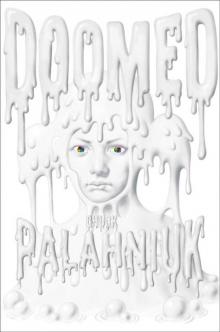 Doomed
Doomed Lullaby
Lullaby Snuff
Snuff Burnt Tongues
Burnt Tongues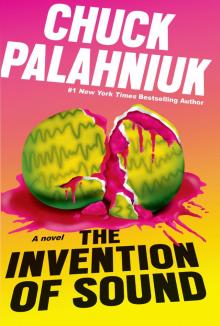 The Invention of Sound
The Invention of Sound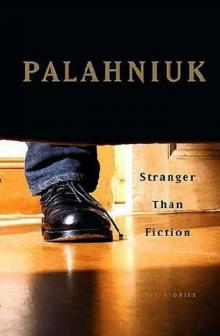 Stranger Than Fiction (True Stories)
Stranger Than Fiction (True Stories) Rant: The Oral History of Buster Casey
Rant: The Oral History of Buster Casey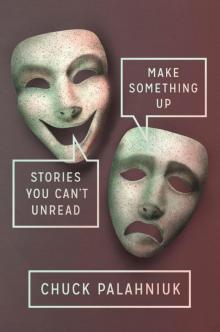 Make Something Up
Make Something Up Rant: An Oral Biography of Buster Casey
Rant: An Oral Biography of Buster Casey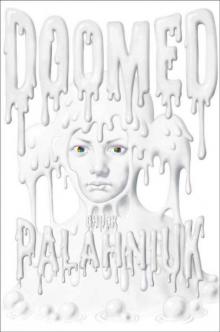 Doomed d-2
Doomed d-2 HOPE AND GORY
HOPE AND GORY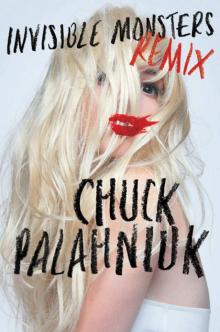 Invisible Monsters Remix
Invisible Monsters Remix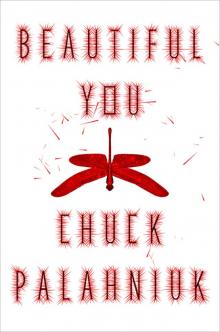 Beautiful You
Beautiful You Fugatives & Refugees
Fugatives & Refugees